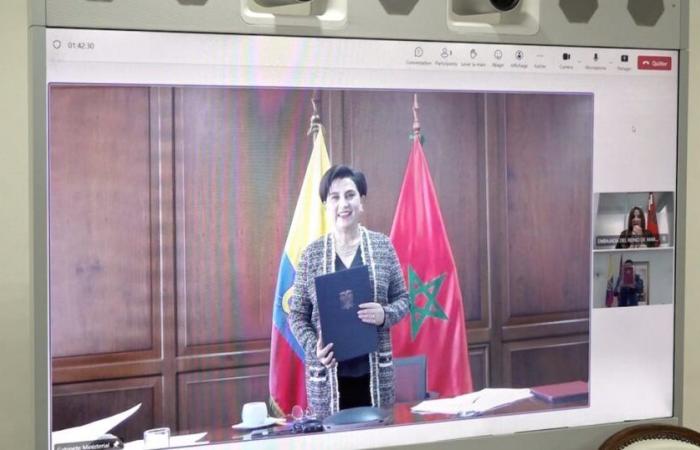In his last speech on the occasion of the anniversary of the glorious Green March, the Sovereign indicated that “the matter of our territorial integrity is at a phase which requires the permanent mobilization of all».
And this is precisely whatincreased mobilization” on which HM the King had insisted, which made it possible to convince certain Latin American countries of “therighteousness of our Cause and to thwart the maneuvers of adversaries» from Morocco.
From Ecuador to Panama, via Peru, Brazil, Paraguay and more recently Chile, expressions of support for the Moroccan position have, of course, taken different forms, but they converge towards a single reality: credibility and the realism of the autonomy initiative to resolve the artificial dispute around the Moroccan Sahara are the best allies of the argument on the good rights of Morocco in its southern provinces.
In October, the Republic of Ecuador decided to suspend its recognition of the pseudo “SADR”, which it had recognized in 1983, with the opening of a so-called embassy in 2009.
Read also: Moroccan Sahara: Panama suspends its diplomatic relations with the pseudo “RASD”
This decision, which opens a new chapter in relations between Rabat and Quito, is part of the continuity of the dynamic driven by HM the King, to strengthen ties with the subcontinent, since the royal tour in countries of Latin America in 2004.
A month later, it was Panama’s turn to follow suit by suspending its diplomatic relations with the so-called “SADR”.
This succession of victories made Miguel Angel Rodriguez Mackay, former Peruvian Minister of Foreign Affairs and a fine connoisseur of international law, say that the withdrawals of recognition of the pseudo “SADR” are “inevitable».
«The pseudo SADR, as we know, does not exist under international law (…) and the Panamanian decision joins the overwhelming international trend which, in recent times, recognizes, on the one hand, the sovereignty of the Kingdom of Morocco on its Sahara, and on the other hand, confirms its total adherence to the autonomy proposal», continued the former head of Peruvian diplomacy.
If Panama had been the first country in the Latin American region to recognize the so-called “SADR” in 1978, it must be emphasized that with the withdrawal of this recognition, almost five decades of deception and lies disappeared under the blows of a serene, proactive and dynamic Moroccan diplomacy.
Read also: Ecuador: after the withdrawal of recognition of the “Rasd”, its representatives expelled in unclean conditions
In this regard, the dean of the Faculty of Law of the University of Colombia (UNICOC), Hernan Olano, explained the Moroccan approach, under the leadership of His Majesty the King, in the defense of territorial integrity and which mark a “transition from a reactive to a proactive approach» in defense of the first national cause.
Hernan Olano also highlighted the role of parliamentary diplomacy and civil society organizations in this battle, particularly in Latin America.
Thus, in November, the Paraguayan Senate provided unequivocal support for the territorial integrity of Morocco, while insisting that the government of this country adopt the same position.
In a resolution endorsed by the plenary session of this legislative institution, it was a question of the autonomy initiative as the only basis for achieving a peaceful, just, lasting and mutually acceptable solution to the dispute in the Sahara, within the framework of respect for the sovereignty and territorial integrity of the Kingdom.
At the beginning of December, the Chamber of Deputies of Paraguay urged the government of this country to express explicit support for the Moroccan Initiative within the international spaces and forums in which it takes part.
Previously, the Brazilian Senate had expressed itself in favor of the autonomy plan and the Brazilian Minister of Foreign Affairs had welcomed, from Rabat, the serious and credible efforts made by the Kingdom to move forward towards a settlement of this dispute .
In a remarkable development of his country’s position on the national question, the Chilean Minister of Foreign Relations of the Republic of Chile, Alberto Van Klaveren, expressed “Chile’s constant support for (…) a just, pragmatic, lasting, realistic, viable, definitive and mutually acceptable solution to the question of Western Sahara, within the framework of the initiative presented by Morocco to the United Nations in April 2007».
Read also: Sahara: Chile once again takes up the cause of Morocco’s autonomy initiative
In Peru, which withdrew its recognition of the so-called “SADR” in 2023, parliamentary voices, including that of deputy Ernesto Bustamante, insist that this country join the thirty states which have opened consulates in the southern provinces.
In regional legislative bodies, the dynamic is as inexorable as on the diplomatic level. The recent creation of a Morocco-Latin America-Caribbean Economic Forum is part of the numerous breakthroughs achieved by parliamentary diplomacy.
This Forum brings together the House of Advisors and several regional parliaments from Latin America and the Caribbean to strengthen strategic relations between the parties and establish a formal and permanent institutional framework for interregional parliamentary dialogue.
The Latin American part includes the Mercosur Parliament (Parlasur), the Central American Parliament (Parlacen) and the Andean Parliament (Parlandino).
The Forum of Presidents of the Legislative Powers of Central America, the Caribbean and Mexico (FOPREL), within which Morocco enjoys the status of “Advanced Partner”, recently welcomed the Royal Atlantic Initiative, a position that could not be clearer in support of the Moroccan approach.
Beyond the diplomatic and parliamentary arenas, Morocco has also won the battle of Latin American public opinion, particularly in universities and the media by gradually and patiently eroding the worn-out justifications of the Polisario and its ideological supporters. grouped within the Sao Paolo Forum.
The obsolescence of the separatist thesis in Latin America is the sign of an inevitable shift in perceptions of the Sahara question among the elites of this region.
Formerly maintained by generous Algerian funding, the edifice erected by the separatists in Latin America is faltering in the face of credible and persevering Moroccan diplomacy. It is promised to be swept away quickly by the winds of reason and reality on the ground.
Par Rachid Mamouni (MAP)
12/29/2024 at 1:36 p.m.






